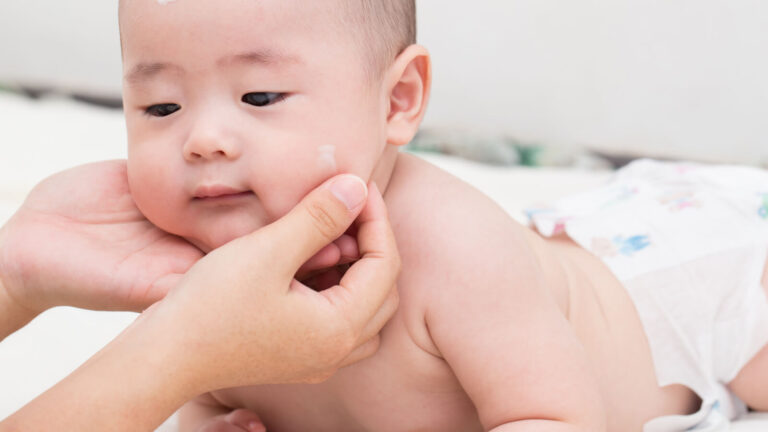KNOWLEDGE/
Six Tips to Prevent Seasonal Skin Issues for Babies

Autumn has arrived, and the weather is gradually getting cooler. As parents, it’s important to dress babies warmly to prevent them from catching a cold, but we must also remember to care for their delicate skin. This reduces the chances of skin issues and keeps their skin soft and hydrated!
Four Main Reasons Babies Get Eczema
When the weather changes, many parents worry about their babies developing eczema or experiencing flare-ups that cause itchy skin. However, parents might not fully understand the triggers for eczema. Let Dr. Chan Shang-Hei, a dermatologist, explain a few key points!
1. Delicate Skin and Weak Immune System
Babies have soft, smooth skin, and their immune systems are still developing, making them more vulnerable to bacterial and viral invasions. This increases the likelihood of developing eczema or experiencing flare-ups
2. Dry Weather and Low Humidity
As the weather cools, humidity levels drop, causing baby’s skin to become dry and more susceptible to eczema or flare-ups.
3. Poor Regulation and Adaptation
Babies’ bodies are not as adept at regulating their internal systems as adults, making it harder for them to adapt to external weather changes. This can lead to increased vulnerability to bacteria and viruses.
4. Less Oil and Increased Moisture Loss
Everyone’s skin secretes a layer of oil that acts as a protective barrier. However, babies produce less oil than adults, reducing their skin’s ability to retain moisture and leading to dryness.
Other Common Fall and Winter Skin Issues
In addition to eczema, Dr. Chan points out that there are three other common skin conditions that babies may experience during the fall and winter. Parents should be aware and attentive to their baby’s skin condition.
- Angular Cheilitis
When the weather is dry and humidity is low, babies’ skin loses moisture rapidly, and with less oil production, their skin’s ability to retain water diminishes. This can lead to dryness and itching, particularly around the corners of the mouth, which may become red. If parents do not apply moisturizer, small blisters can develop, potentially leading to infections. Additionally, saliva contains enzymes that help break down food and skin, and if babies drool frequently or suck on their fingers, this can irritate the skin and lead to angular cheilitis, causing burning and pain, which may decrease their appetite.
2. Chilblains
Babies, being small and unable to protect themselves, are prone to chilblains when the weather is cold, especially when they kick off their blankets during sleep. Their noses and ears, having less blood supply, are also susceptible. Chilblains start as pale spots, gradually turning purple and then red and swollen, causing itching and discomfort. If severe, blisters may form, necessitating a visit to the doctor.
3. Diaper Rash
When a baby’s diaper is too wet, it can lead to fungal growth in the creases of their skin, resulting in diaper rash, which can cause severe irritation. Parents should change diapers frequently, immediately replacing them when wet. It’s essential to clean the baby’s bottom thoroughly and apply a zinc oxide-based diaper rash cream to protect the skin from direct contact with moisture.
Six Tips to Prevent Seasonal Skin Issues for Babies
To avoid skin problems for babies, Dr. Chan advises parents to pay attention to every detail in their baby’s care and not to let their guard down.
1. Keep Skin Clean and Dry
Parents should frequently change diapers to keep the baby’s bottom dry. Even in cold weather, daily baths are important for maintaining hygiene. If worried about the baby getting cold, parents can choose to bathe them during the warmer parts of the day.
2. Control Bath Water Temperature and Duration
Although it’s colder in autumn and winter, parents should avoid using hot water for baths, as it can strip the skin of its natural oils. Additionally, prolonged bathing can lead to dryness, so bath time should ideally be kept under five minutes.
3. Choose Tested Skincare Products
Since babies’ skin is more delicate than adults’, parents should select skincare products specifically designed for babies, free from high concentrations of alkalines, fragrances, additives, and preservatives. Products tested by the FDA are also recommended for their proven safety.
4. Apply Moisturizer Regularly
Parents should remember to apply moisturizer multiple times a day, with no set limit on frequency. Applying lotion immediately after a bath can enhance absorption and hydration. A fragrance-free lip balm can also be used, avoiding mint flavors that may irritate the skin.
5. Dress in Cotton for Warmth
Parents should choose breathable, cotton clothing for their babies, especially if they have eczema, to prevent skin irritation. When dressing babies in sweaters, it’s best to layer cotton underneath to avoid direct contact with the skin. When going outside, ensure to use gloves, hats, and warm socks for adequate warmth.
6. Maintain Home Hygiene
Preventing skin issues also involves keeping the home clean. Parents should regularly clean their living environment and avoid using carpets or stuffed animals that can accumulate dust mites and bacteria, which may exacerbate skin sensitivity.


